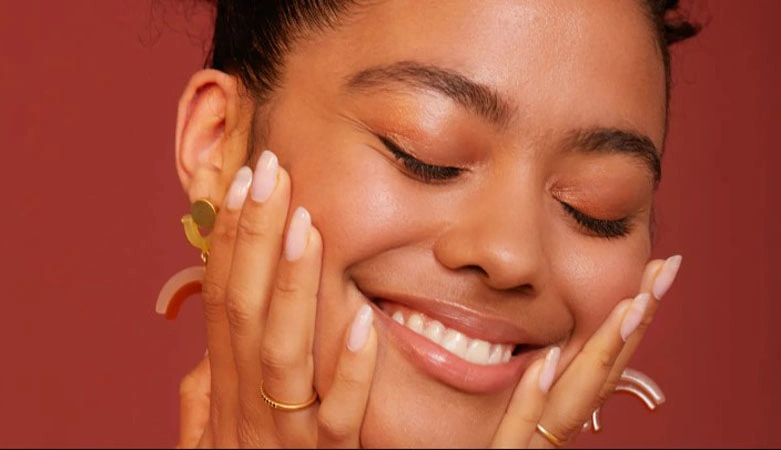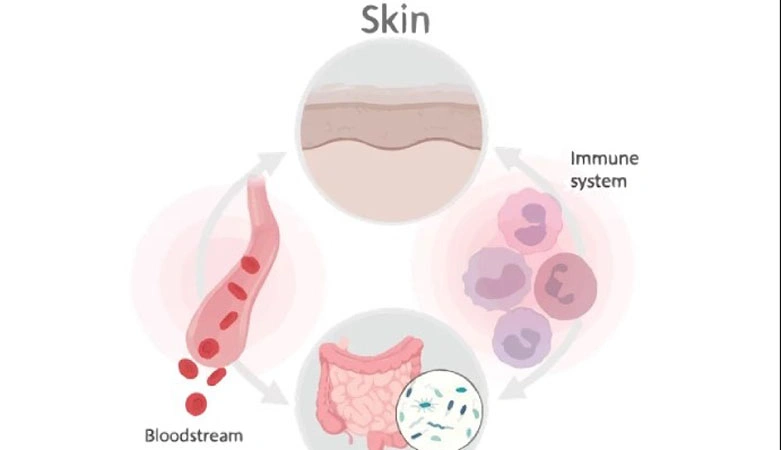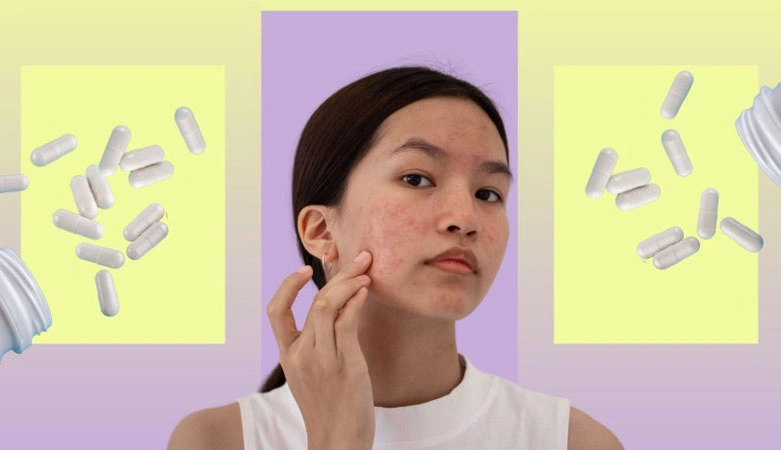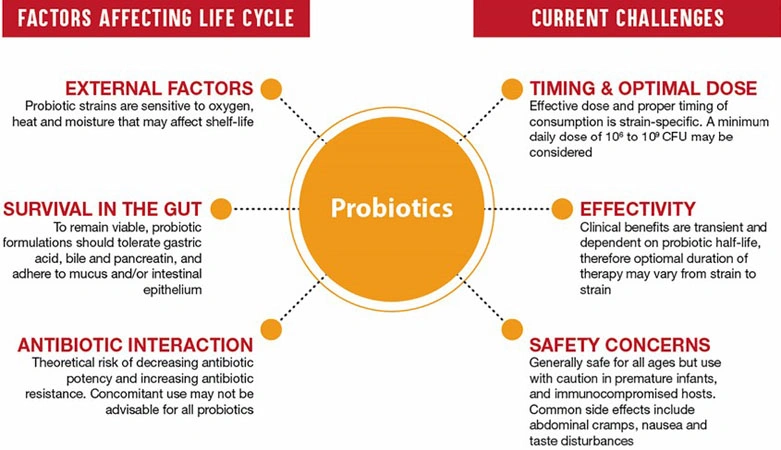Probiotics and Skin Health: Can They Help Clear Up Acne?
- Families
-
- UPDATED November 21, 2024

by Tasha Mayberry
690 shares
Probiotics are live microorganisms. They are considered beneficial since they may have a positive impact on the body.
For decades, probiotics have been used to improve gut and overall health. But, in recent times, their popularity has increased. In part, this is due to their potential benefits on skin health.
But, are probiotics really helpful in clearing up acne and other skin-related problems? This article will answer this and other questions about probiotics and the skin.
What are probiotics?
Probiotics are ‘good’ live microorganisms, such as bacteria and yeasts. They help support gut health, immunity, and overall health.
This is possible because probiotics can help regulate the microbiome, which is also known as the microbiota or flora.
The microbiome refers to the community of ‘good’ and ‘bad’ microorganisms that live in the body. This includes the gut, skin, and mouth.
So, probiotics are useful for maintaining an adequate and healthy microbiome balance.

The gut-skin connection
Studies have found that there is a two-way connection between the gut and the skin. This connection is called the gut-skin axis.
Thus, an imbalanced gut microbiome – known as dysbiosis – may have a negative impact on the skin.
This is possible because dysbiosis might promote inflammation and alter some hormone levels. This can contribute to skin conditions such as acne, psoriasis, and rosacea.
In this sense, probiotics may benefit skin health by restoring the gut microbiome.

Can probiotics help with acne?
Probiotics aimed at skin issues can be used orally (taken through the mouth), and topically (on the skin).
There is promising evidence that supports the use of both forms to help with acne and other skin issues.
Probiotics may potentially lead to improved skin health by several mechanisms, including:
- Balancing the skin and gut microbiome.
- Supporting gut and skin health.
- Reducing inflammation.
- Soothing irritated skin.
- Potentially influencing hormone levels.
- Improving the natural skin barrier. Thus protecting the skin from external threats and damage.
- Decreasing the likelihood of acne-causing bacteria overgrowth. The bacteria that causes acne is usually Cutibacterium acnes.
Acne is primarily an inflammatory condition caused by factors like hormonal changes and bacterial imbalances. So, certain probiotic strains may help prevent acne or lessen acne severity.
However, it is important to note that probiotics should not be used as a stand-alone solution for acne.
Skin issues are usually caused by many factors. So, before using probiotics, it is best to consult with a doctor.
A dermatologist can rule out underlying health problems and determine the best treatment.

Types of probiotics for skin health
Several probiotic strains have shown promising results for acne and other skin issues. The most studied strains include:
These probiotic strains have shown positive results for the conditions listed above. However, research is still ongoing. More studies are needed to fully understand the impact probiotics may have on the skin.
How to use probiotics for acne
When using probiotics for acne, you can choose oral, topical, or a combination of both.
Oral probiotics can be found in a wide variety of foods or also as bottled supplements.
Foods rich in probiotics include:
- Yogurt, with live and active cultures.
- Kefir, a fermented milk drink.
- Cheeses, with live cultures (such as cottage cheese or cheddar).
- Sourdough bread.
- Kombucha, a fizzy fermented tea drink.
- Miso soup, a traditional Japanese dish.
- Sauerkraut (fermented cabbage).
- Kimchi (fermented vegetable mix).
- Tempeh or natto (fermented soybean products).
If you prefer oral probiotic supplements, you can find them in the form of capsules, powder, or liquids.
On the other hand, topical probiotics can be found as creams, serums, or lotions. They are usually applied directly on the skin once or twice per day.

Safety considerations for probiotics
Generally, probiotics are considered safe for most people. However, certain precautions must be taken, especially when used over long periods.
For instance, people with compromised immune systems need to be cautious, as certain strains could increase their risk of infections.
Additionally, excessive use of topical probiotics may cause skin irritation. Especially when not following the recommendations provided by the manufacturer.
Besides this, probiotic supplements often need to be stored in a cool, dry place. Improper storage can reduce their effectiveness or potentially lead to bacterial contamination.
So, consult with a healthcare practitioner before starting any probiotic supplement. Also, make sure to store your products in an adequate place.

Alternatives to probiotics for skin health
Besides probiotics, other alternatives may help you improve your skin health, reducing acne:
- Avoid high-glycemic foods. High-glycemic foods include white bread and sugary snacks. They can spike blood sugar and induce hormone imbalances. Eventually, this may trigger or worsen skin issues.
- Increase the intake of foods rich in antioxidants and vitamins. These foods include fruits and vegetables. They may help protect the skin from oxidative damage, which can worsen acne and aging signs.
- Include omega-3 fatty acids in your diet. These fatty acids are commonly found in walnuts and certain types of fish. They have anti-inflammatory properties that may help reduce acne severity.
- Stay hydrated. Hydration is a primordial part of skin health. Aim for six to eight glasses of water each day.
- Control your stress levels. Stress triggers the release of hormones that may stimulate oil production and inflammation. Thus worsening skin issues.
- Do not over-clean your face. A gentle non-foaming cleanser twice per day is typically sufficient to keep your skin clean.
Do not forget your sunscreen. Use a sunscreen with a SPF 30 or higher. This may help prevent skin inflammation and acne-related scarring.
Conclusion
Probiotics may potentially induce several health benefits. Depending on the strain, they might be useful to manage acne and other skin conditions.
Clinical trials have shown promising results in this regard. However, research is ongoing. At the time, probiotics can not be used as a stand-alone treatment for acne or any other condition.
So, before using probiotics as an aid to help clear up acne, we recommend seeking help from a dermatologist. This doctor can get you a personalized routine tailored to your needs and make sure probiotics are safe in your case.
FAQs
- Can probiotics improve acne quickly?
No, as acne is multifactorial and probiotics work gradually to balance the microbiota. So, improvements in skin inflammation or acne may only be noticeable after a few weeks of probiotic use.
- Are topical probiotics better than oral supplements for acne?
They work differently. Topical probiotics work externally by reducing local inflammation and balancing the skin microbiome. Meanwhile, oral supplements work from the inside out. Oral probiotics balance the gut microbiome and reduce general inflammation. However, research is ongoing in this area and promising results have been found in using both oral and topical probiotics for acne.
- How long do probiotics take to show effects on the skin?
The results of probiotics on the skin will depend on several factors. The previous state of the skin and gut microbiome will determine how long it can take for probiotics to balance these microorganisms and produce a noticeable effect. In this sense, it might take four to eight weeks for most people to see results with consistent probiotic use.
- Can probiotics replace acne medication?
No. Probiotics are supplements that may help manage acne and other skin issues. However, probiotics can not replace medical treatment in any case. Always consult with a healthcare practitioner to make sure you have the right treatment according to your needs.